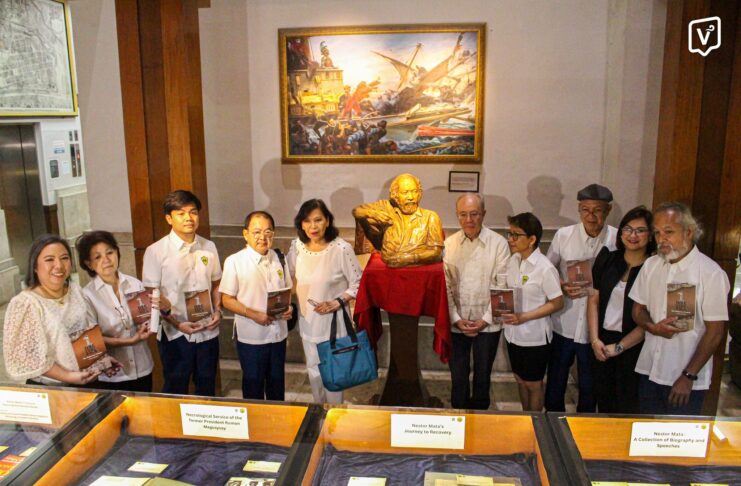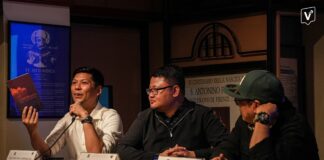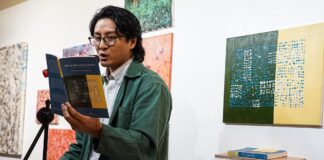View point
MUSIC blasts from a second-hand stereo,
but you offer secrets in a whisper.
Our elbows touch under low lights.
The smoke from my cigarette forms a halo
over your head, but your words
tumble out fast. It’s un-angelic. The air
thickens as you speak of the long-legged
girl who calls you friend. You place a bottle
in front of me. I make a face. Bitterness
hits my tongue the moment you
call her names, recall her mistakes.
You laugh with glassy eyes and stare
at the bottles you’ve emptied. I realize
you are no different from her—
your hair escaping a dismantled ponytail.
Overdose
CLASS! Pass your assignments to the front.”
Erika stared blankly at her professor. She averted her eyes and looked at the whiteboard. It’s been three months, she thought. Three months of waking up with nightmare visions of hospital contraptions hooked up to a dark figure.
“Sir” Keith died of cancer. The one last professor, who would crack jokes with his students has left the campus empty.
Despite teaching a major subject, Sir Keith’s lectures served as a breather for the class, a place where they could be riotous, but still learn.
Mixing poetry and fashion
WHO SAID fashion can’t go with poetry?
Poet Carlomar Arcangel Daoana, a former UST Center for Creative Writing and Studies junior associate for poetry and Varsitarian associate editor, crosses over to the world of the “fabulous” with his second book, The Fashionista’s Book of Enlightenment (Designed By Words, 2009), a collection of 43 poems that tackle the complexities of couture, passion and loss. This follows his first collection, Marginal Bliss, which was released in 2002.
Panglao
Heaven’s mirror crashes on virgin
ground,—jolting his senses.
She wades through its crystalline fluid and the stars awake,
dancing in intricate synchrony.
The smell of coconuts and salt in the air
resting on her sand-strewn hair.
Beneath the surface, seaweeds sway,
while streaks of color dart back and forth in anxiety —
The giants have returned once more.
He clasps his pale hand over her burnt, brown skin,
“Everything at its own pace,” she calmly says.
I am home.
Mika Rafaela A. Barrios
Fireworks cap Ustetika’s 25th year
Well-loved teacher
THE MEDIOCRE teacher tells the day’s lesson, the good teacher explains it, the superior teacher demonstrates it. The great teacher does more than deliver the lesson effectively -- she inspires.
Greatness is thus ascribed to Carolina U. Garcia, one of UST’s most renowned English and Literature educators such as Paz Latorena, Clemencia Colayco, and Milagros Tanlayco. Through her erudition, effective pedagogy, and maternal solicitude, the late professor inspired several generations of students who have become prominent men and women in education, letters, and other fields including medicine.
To mark her birth centenary this year, UST held the national conference, “Visions and Articulations: The Carolina U. Garcia Centennial Conference on the Teaching of Literature,” last Novermber 18-20.
So what’s new with ‘new writing’?
IS NEW writing necessarily only by the young? Are old writers capable of new writing? Does new writing involve a sacrifice of quality and style just for the sake of looking new?
With the theme, “New Writing in the Philippines,” the Philippine PEN (Poets, Playwrights, Essayists, Novelists) Annual Conference at Bulwagang Pambansang Alagad ng Sining of the Cultural Center of the Philippines last December 5 focused on recent developments in literature.
Rody Vera of Writers’ Bloc, an organization of playwrights, noted the public’s receptiveness to fresh ideas in theater during the panel on “Accent on Young Writers.”
“There is a demand for something new and something that is not required,” he said.
But historian and playwright Jose Victor Torres said there was a seeming decline in the quality of works by new writers due to media and technology.
400 years of grace in poetry
ONLY the finest wine is worthy of praise as it grows delectable with age – and this is how the students of the Univers ity of Santo Tomas revere their beloved school in the book Alma Mater, a compilation of poems collected and edited by Fr. Fidel Villaroel, O.P., UST’s assistant Archivist.
Alma Mater is one of the books released to commemorate the University’s quadricentennial year, with its goal of producing 400 books by 2011.
The poems are in Spanish, Filipino and English, a testament to the participation of the University in Philippine history.
The post-revolutionary period ushered in an emergence of Filipino poets using the Spanish language as the Third Centennial of the University closed in. As Villaroel phrased it, the poems of these era were “very Castillian, yet with a Filipino rhythm; so Oriental yet so classically Spanish and so exotic, yet so familiar.”
Erase and rewind
ANA CERVANTES thought nothing could ruin the night.
She stood at the far end of the restaurant’s parking lot, humming softly as she opened the door of her second-hand Civic. It was dark in the area for half of the lamps were already turned off, but she wasn’t bothered. She was in a celebratory mood, her heart light over being offered her own column. She smiled as she got in the car, her mind still wrapped up on the night’s happenings. She locked the doors and was about to start the engine.
Then, a gunshot.
She ducked down, her small frame making it easy to squeeze most of her upper body in the cramped space under the steering wheel. Bang. She dared not look up, the guts that came easy on coverage flying out of the window. Her chest was pressed against her thighs and she could feel her heart pounding.
Bang.
No Nat’l Book Award for UST
THE UST Publishing House hit a dry spell after none of its six nominated books won an award in the 28th National Book Awards held at the Ayala Museum in Makati.
The Publishing House had six finalists in the different categories. They are Nicanor Tiongson’s The Cinema of Manuel Conde, a study on the prolific Filipino director’s life and works, was nominated in the Autobiography/Biography category, Abdon Balde, Jr.’s Awit ni Kadunung, a story that weaves together the ethnic and modern in today’s society in Fiction, Everyday Warriors: The Faces and Stories of Breast Cancer by Cathy Paras-Lara and Jay Lara in General Nonfiction, while its designers Rachel and Sheree Ti were finalists for the Design category. The book is a collection of interviews with 21 breast cancer survivors from all walks of life.












